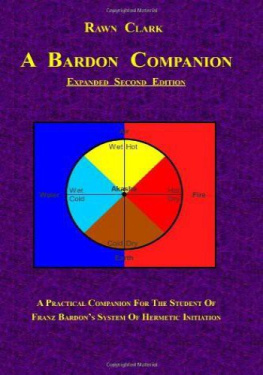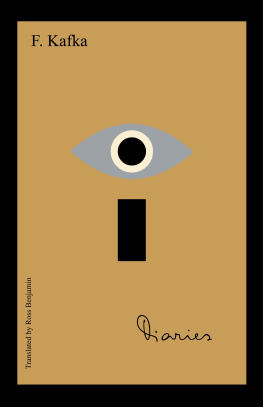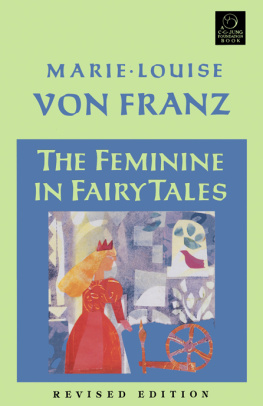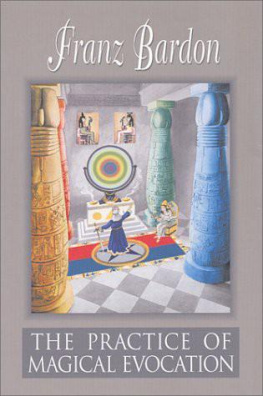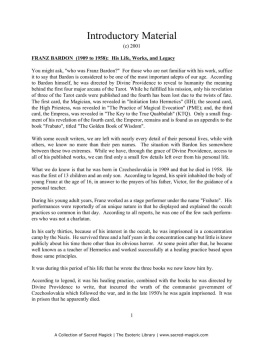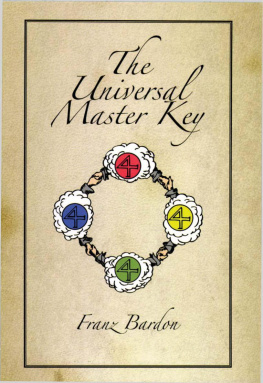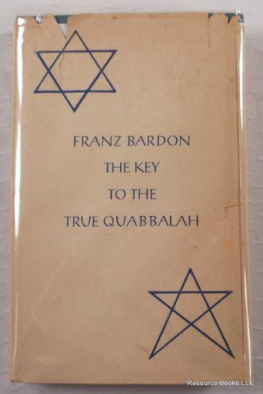A Bardon Companion
Rawn Clark
A Bardon Companion

Authors Preface
On a few occasions, I have been asked to write some sort of student's guide to Franz Bardon's "Initiation Into Hermetics". Each time, I responded with something like "I can't think of anything to add." And for years I've held this opinion, but my experiences participating in an Internet e-board discussion group about Bardon's works has led me to reconsider that sentiment. So, when I was asked to rewrite the Franz Bardon FAQ that appeared on a popular website, I consented to write a few things concerning the first four Steps of IIH. Little did I know at the outset that I'd find all kinds of things to say! Word junkie that I am, I ended up writing no less than 37 full pages of commentary and answers to commonly asked questions. Even at that, hundreds more pages could be written.
Making things understood, presenting concepts in such a way that it is easy for the reader to grasp them, is the responsibility of the writer. But the writer's responsibility stops there it is up to the reader to do the understanding itself. And its the reader who doesn't quite grasp the author's meaning thats the one responsible for trying to figure it out. That is indeed the failing of a written thing there is no chance for dialogue and for putting all your questions to the author for clarification. Consequently, many written things remain misunderstood by many, or at least only partially understood.
In the case of Franz Bardon's books, this is compounded by the fact that as he wrote them, he placed himself in the perspective of the student who is actually involved with the labor of the material he describes. For instance, when he describes the exercises of Step Five in IIH, he is saying things that only a student who has done the labor of the Step One, Two, Three and Four exercises, will understand. Thus, the student who is in the middle of Step Two, or the student who is reading IIH for the first time and hasn't even begun the work, will understand what Bardon wrote regarding Step Five, less completely than someone who has completed the Step Four work.
This was certainly the case for me and as I progressed through the Steps. I was repeatedly surprised to find that I had previously misunderstood things in the mere reading of the text that now made perfect sense because I had done the work leading up to that point in the path. It was within this thought that I found a reason for writing my commentaries.
I firmly believe that anyone who has progressed through IIH up to the start of Step Five, has no need for outside advice. The student of Step Five will have mastered the most rudimentary techniques upon which the remainder of the course is constructed. Plus, the student will have learned the ability to puzzle out their questions on their own and will have, by necessity, honed this skill to a razor sharpness. At this point, IIH becomes much easier for the student.
This stage, typified by the student's ability to ask their questions internally and seek out answers through their own experimentation, is a necessary part of the path of initiation. As you trod the path of initiation, the responsibility for your progress falls more and more into your own hands. Inquisitiveness and inventiveness are both important allies of the student of magic and there are certain passages where that is all you will have at your disposal to work with.
I have tried to find a balance between giving this fact its due respect and trying my best to steer away from giving encouragement to those who wish to leap farther than they are truly prepared to step. My compromise has been to do two things in regard to IIH: First, I have limited my detailed commentary and practical suggestions to the "Theory" section and the exercises of Steps One through Four.
Second, I have written a commentary on Steps Five through Ten which outlines some of the points where Bardon's way of writing from the student's immediate perspective interferes with the understanding of the unprepared reader. I will not offer my practical advice for these later Steps other than in personal correspondence or conversation with practicing students of those particular Steps. The same holds true for Bardon's second and third books, the "Practice of Magical Evocation" and "The Key to the True Quabbalah." I should add here, that I don't expect I'll ever be asked such questions anyway. Everyone that I know that has reached these stages in their initiation does not need to ask the advice of another person, consequently they don't ask.
All of my internal rationale aside, I do have concern that those who read IIH or who look ahead to the Steps to come, will get the wrong picture of what it all really means. At many places in IIH, Bardon has to resort to metaphors that can only be understood if you already know what all went into the metaphor in the first place. It is difficult for the reader to make the subtle connections between what is learned in one Step and what is then applied in a new way in the next.
My concern is especially sharp when it comes to Bardon's PME and KTQ. All too often I have encountered students who pick up PME and want to START with evocation while totally overlooking what Bardon says (repeatedly) about having to first reach the end of the Step Eight of IIH (or its equivalent by other means) before beginning the work of PME or KTQ. It is easy to think from the mere reading of these two books that it is really possible to ignore Bardon's stated prerequisite, but the reality is an entirely different matter and Bardon's admonition is completely accurate. This sort of misunderstanding of PME is, in my opinion, due to a lack of background in genuine magic and the consequent inability to truly understand the deeper significance of what is being said. This is inescapably natural and what I have said is meant only as a statement of fact that must be dealt with openly and not as a criticism.
For this reason above all others, I will attempt, through my own commentary, to help the reader at least become aware of the places where this is an important addition to their understanding of the author's deeper meaning. Whether or not my comments actually add to your understanding is out of my hands all I can promise is that I will try my best.
I would ask that as you read my comments, you do so with this thought in mind: The only true teacher is experience. Even though a thousand sages will spend a billion words trying to explain the Mysteries, you will not truly understand their full implications until you yourself have penetrated what lies beyond the veil. But never let this dissuade you from doing your damnedest to penetrate this veil it is only gossamer, as they say. The further you penetrate, the deeper your understanding will grow; and the deeper your understanding, the deeper into the Mysteries will you penetrate. Hold your conclusions with loose hands so that you may always be able to re-form them. Always remain willing to deepen your understanding the main barrier to this is holding on too tightly to our conclusions. Adopt your own conclusions not those of another. This is especially true considering that all I can offer you here are my own conclusions and yours might be far different than mine. The best I hope for is that reading about a few of my conclusions will inspire you to question and expand your own conclusions.
My best to you !Rawn Clark
FRANZ BARDON (1909 to 1958): His Life, Works, and Legacy
You might ask, "who was Franz Bardon?" For those who are not familiar with his work, suffice it to say that Bardon is considered to be one of the most important adepts of our age. According to Bardon himself, he was directed by Divine Providence to reveal to humanity the meaning behind the first four major arcana of the Tarot. While he fulfilled his mission, only his revelation of three of the Tarot cards were published and the fourth has been lost due to the twists of fate. The first card, the Magician, was revealed in "Initiation Into Hermetics" (IIH); the second card, the High Priestess, was revealed in "The Practice of Magical Evocation" (PME); and, the third card, the Empress, was revealed in "The Key to the True Quabbalah" (KTQ). Only a small fragment of his revelation of the fourth card, the Emperor, remains and is found as an appendix to the book "Frabato", titled "The Golden Book of Wisdom".
Next page
